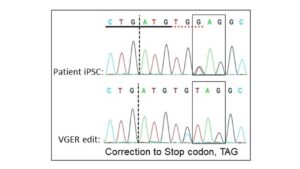Human iPSCs
iPSC service description:
VGER can perform full-service human induced pluripotent stem cell genome editing projects on a collaborative basis. Projects require director pre-approval of project timeline, staff effort support, and supply fee for a period to be determined based on genome editing project complexity. We are happy to consult with you to discuss your project ideas.
iPSC cell availability:
- WTC-11
- dCas9-KRAB
- Patient-derived (requires additional characterization prior to acceptance)
Types of projects available:
- Knockouts, point mutations, and short fusions, such as epitope tag, are produced using CRISPR RNPs and ssDNA delivered by electroporation
- Larger KIs up to 3 kb are produced using AAV6-packaged ssDNA donors and RNP electroporation.
- CRISPR interference iPSCs can be produced by delivery of sgRNA-expressing transposons by piggyBac transgenesis.
Why work with VGER instead of a company?
VGER provides you with any or all the clones produced for your project, not just 1-2. We can assist with grant preparation, manuscript preparation, and offer general advice to help you work with the iPSCs we produce in your own lab.
Why work with VGER when you have plenty of hands in your own lab?
VGER staff are highly skilled in CRISPR editing design and can design highly efficient strategies with straightforward screening assays. High quality iPSCs are necessary to produce healthy genome edited iPSCs. Chromosomal mutations can occur in stressed cell cultures or may be present in the original patient cell line. VGER has dedicated cell culture rooms for iPSC editing so there is no fear of contamination and staff are highly skilled at culture.
Quality control
iPSCs are cultured using StemCell Technologies TeSR media and reagents. We visually inspect iPSC colony morphology daily with light microscopy. We test for mycoplasma on a routine basis. We can also perform qPCR arrays to detect common chromosomal aberrations found in iPSCs using commercial assays. We do not offer karyotyping analysis.
Past project data:
